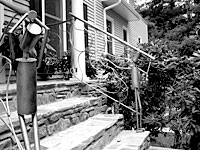It’s hard enough for a craftsperson to sell work to clients concerned about whether the piece goes well with their couch.

It’s even harder when the craftsperson is selling the couch.
To help craftspeople get a proverbial foot in the door before a house is even built, Handmade in America is partnering with crafts organizations and developers across Western North Carolina to urge home builders to think about integrating regional artisan design into their building plans. As Handmade’s associate director Jenny Moore explains, it makes more sense to invest in a terrific set of wooden cabinets before the kitchen is completed.
“With stained-glass windows, or a steel railing going up the stairs, the sooner you get going, the better,” she notes.
Contemplating crafts at the outset of a building project is better for the homeowner, who likely doesn’t want to deal with the headaches of swapping out furniture or floor tiles for locally produced pieces, and for the craftsperson, who stands to make a nice chunk of change on the commission.
“The way things are moving, one way an artist can make a living is to approach art as an architectural element,” suggests Julia Burr, a Black Mountain sculptor who works in metal. “It’s a new outlet.”
Although there aren’t any reliable statistics on craft buying in the Carolinas, Moore says she often hears craftspeople complaining about the current state of the craft-selling scene. “I hear from people all the time that sales are off,” she says. While nobody’s exactly sure why sales are down—“there are as many theories as there are people,” sighs Moore—Handmade hopes to create a new, reliable revenue source for craftspeople by marketing their products to high-end developers and well-to-do home builders.
“The thinking was there’s so much building going on in Western North Carolina,” says Moore, explaining the strategy. “Often the developers are coming from out of state. The architects are from out of state, the designers are from out of state, and nobody knows about the wealth of craft here.”
To combat that pervasive unfamiliarity, Handmade has issued a designer’s sourcebook of handcrafted architectural elements. The group is now at work on a similar index of freestanding crafts, such as tables and chairs.
Eric Lloyd Wright, who will deliver the keynote address at a craftspersons’ expo that Handmade is planning for the ultra-ritzy Mountain Air Country Club in Burnsville, believes a building should harmonize with its surrounding cultural and natural landscapes. He praises handcrafts as a way of introducing indigenous visual traditions into the home.
“The best is when the house is made to fit uniquely into the environment,” offers Wright, an accomplished architect and grandson of Frank Lloyd Wright. “This is what it’s all about: creating space, not just a structure.”
Although Wright admits it’s highly unusual in the building business, he believes having craftspeople involved in every stage of a project makes for a better home.
“Of course, if this is really done properly, the architect, craftsperson and homeowner all work together on an equal basis,” says Wright, faintly echoing his grandfather’s legendary contempt for clients before catching himself: “Well, the homeowner is probably the most important.”
When Wright speaks of crafts, he isn’t thinking of the quaint quilts and turned wood bowls that line the walls of the Folk Art Center. He fancies quintessentially modern pieces.
“My preference is for craftspeople to be expressing themselves in their own 21st-century way,” Wright says.
Since designers’ preferences often determine where and how builders of multi-million-dollar second homes spend their money, Handmade is bent on facilitating communication between designers and artists. The centerpiece of the group’s effort is a showcase home at The Ramble, a luxury development just south of Biltmore Forest, that will feature local handcrafts. Moore says the house, slated to debut in 2008, will serve as a model for future collaborations.
To prime artists for the process, Handmade is also offering a series of workshops on topics including blueprints and building codes. Craftspeople who complete the course will receive a certificate from A-B Tech.
Moore thinks wealthy homeowners could help save the area’s handcraft tradition, which has been dealt a serious blow by the sluggish market.
Moore reports that there are now few young craftspeople in Western North Carolina.
“If there’s work, people will do it,” declares Moore. “We don’t want this to die out. We want people here who make beautiful functional things.”
Many of those things will soon be on display at Handmade’s storefront on South Lexington Avenue and at the HandCrafted Home Renaissance at Mountain Air, where attendees can visit booths hosted by 50 local craftspeople and gape at inspirational “vignettes”—set pieces suggesting how crafts can be used in a room.
“They’re going to be spending the money anyway, so why not make something that’s beautiful and going to last and ties into the local community?” Moore says, referring to the area’s prospective home builders. “That’s the ideal people should have when they’re building.”
[Hanna Rachel Raskin is Xpress’ food editor.]
Handmade in America and the Toe River Arts Council present the HandCrafted Home Renaissance at the Mountain Air Country Club in Burnsville on Saturday, June 23, and Sunday, June 24. $25. (866) 342-0637.


Before you comment
The comments section is here to provide a platform for civil dialogue on the issues we face together as a local community. Xpress is committed to offering this platform for all voices, but when the tone of the discussion gets nasty or strays off topic, we believe many people choose not to participate. Xpress editors are determined to moderate comments to ensure a constructive interchange is maintained. All comments judged not to be in keeping with the spirit of civil discourse will be removed and repeat violators will be banned. See here for our terms of service. Thank you for being part of this effort to promote respectful discussion.